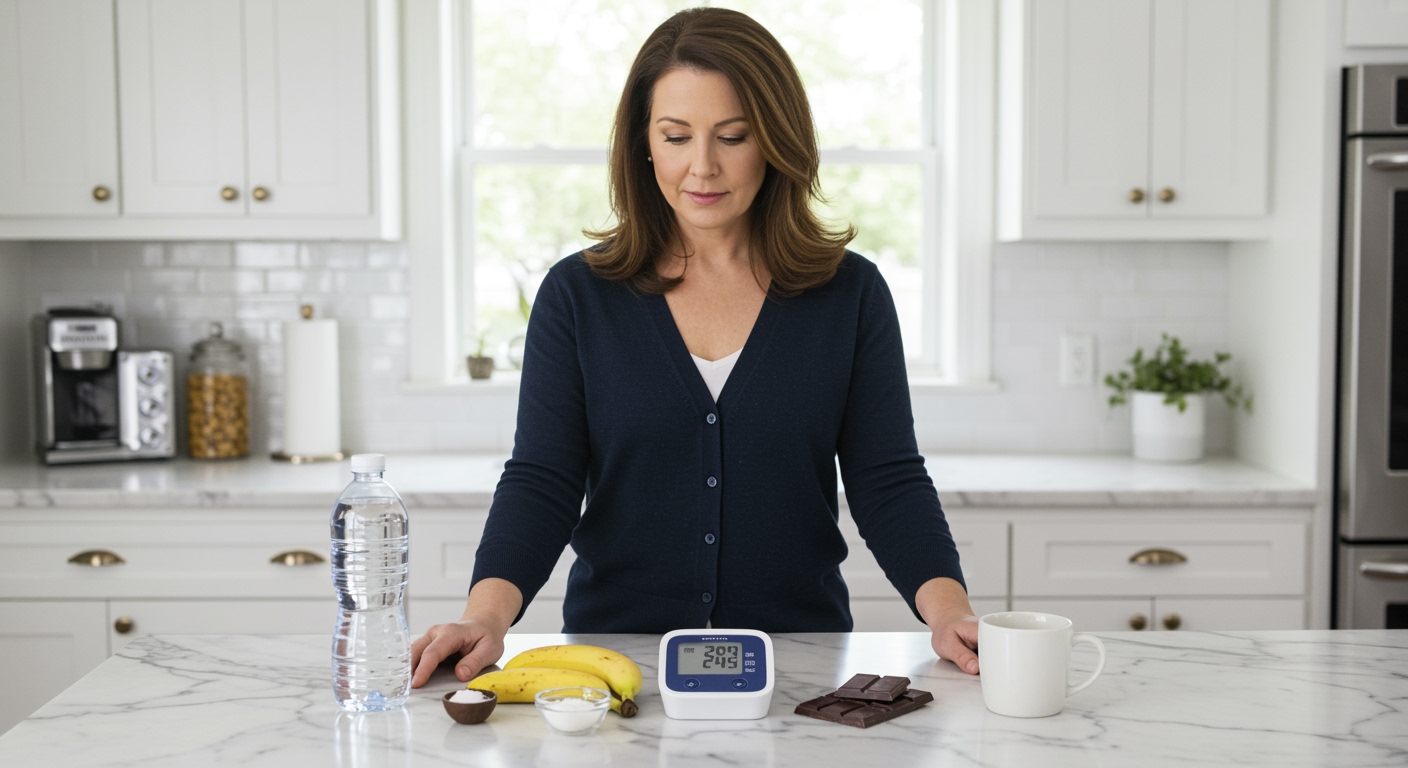✪ Key Takeaway: People with hypotension should limit alcohol, excessive caffeine, and high-potassium foods that can further lower blood pressure.
Introduction
Your doctor just told you that your blood pressure is too low, and now you are wondering what foods you should avoid.
Most people with hypotension get advice about what to eat, but rarely do they learn about foods that could make their condition worse.
Hi, I am Abdur, your nutrition coach, and today I am going to explain which foods people with hypotension should avoid and why these dietary restrictions matter for your health.
Should You Limit Alcohol With Low Blood Pressure?
Alcohol acts as a vasodilator, which means it relaxes and widens your blood vessels.
When your blood vessels dilate, your blood pressure drops even further than it already is with hypotension.
This effect happens because alcohol interferes with the sympathetic nervous system, which normally helps maintain adequate blood pressure.
Research shows that even moderate alcohol consumption can cause a significant drop in blood pressure within hours of drinking.
The problem becomes more serious when you combine alcohol with blood pressure medications or other substances that affect circulation.
People with hypotension who drink alcohol often experience dizziness, fainting, or dangerous drops in blood pressure that require medical attention.
If you choose to drink alcohol, limit yourself to one drink per day and monitor your symptoms carefully.
✪ Pro Tip: Always eat food before drinking alcohol to slow absorption and minimize blood pressure drops.
Can Too Much Caffeine Worsen Hypotension?
This might surprise you, but excessive caffeine can actually worsen hypotension in some people.
While caffeine typically raises blood pressure temporarily, people with chronic hypotension often develop a tolerance to this effect.
When caffeine wears off, it can cause a rebound effect that drops your blood pressure lower than before you consumed it.
This happens because caffeine blocks adenosine receptors in your brain, and when the caffeine metabolizes, adenosine floods these receptors causing vasodilation.
Large amounts of caffeine can also cause dehydration through its diuretic effect, which reduces blood volume and lowers blood pressure further.
Some people with hypotension experience heart palpitations and anxiety from caffeine, which can trigger fainting episodes.
Limit your caffeine intake to 200 milligrams per day, which equals about two cups of coffee, and avoid consuming it late in the day.
✪ Fact: Green tea contains less caffeine than coffee but provides sustained energy without the crash.
Are High-Potassium Foods Dangerous For Hypotension?
Potassium is a mineral that helps regulate blood pressure by balancing sodium levels in your body.
While potassium is generally healthy, consuming too much can lower blood pressure by promoting sodium excretion through your kidneys.
This mechanism works through the renin-angiotensin system, where excess potassium signals your kidneys to release more sodium and water.
Foods extremely high in potassium include bananas, avocados, spinach, potatoes, and coconut water.
You do not need to eliminate these foods completely, but you should avoid consuming large quantities in single meals.
The key is moderation and spreading your potassium intake throughout the day rather than avoiding these nutritious foods entirely.
Monitor your symptoms after eating high-potassium meals and adjust portion sizes if you notice increased dizziness or weakness.
✪ Note: People taking ACE inhibitors should be especially careful with high-potassium foods.
Should You Avoid Large Meals With Low Blood Pressure?
Large meals can cause a condition called postprandial hypotension, where your blood pressure drops significantly after eating.
This happens because your digestive system requires increased blood flow to process food, which diverts blood away from other parts of your body.
Your autonomic nervous system normally compensates for this by increasing heart rate and constricting blood vessels, but this response may be impaired in people with hypotension.
High-carbohydrate meals are particularly problematic because they cause rapid changes in blood sugar that can affect blood pressure regulation.
Instead of three large meals, eat smaller portions more frequently throughout the day to maintain stable blood pressure.
Include protein and healthy fats in each meal to slow digestion and prevent rapid blood pressure changes.
Wait at least 30 minutes after eating before standing up quickly or engaging in physical activity.
✪ Pro Tip: Drink a glass of water before meals to help maintain blood volume during digestion.
Do Certain Herbs And Supplements Lower Blood Pressure?
Several herbal supplements and natural remedies can lower blood pressure and should be used cautiously by people with hypotension.
Garlic supplements, hawthorn, and hibiscus tea all have documented blood pressure-lowering effects through various mechanisms.
These substances work by promoting nitric oxide production, which relaxes blood vessels and reduces peripheral resistance.
Magnesium supplements can also lower blood pressure by acting as a natural calcium channel blocker in your cardiovascular system.
Even seemingly harmless herbs like valerian root and passionflower can cause blood pressure drops in sensitive individuals.
Always consult your healthcare provider before starting any new supplements, especially if you take medications for other conditions.
Read labels carefully and research any herbal ingredients in teas, energy drinks, or health products you consume regularly.
✪ Fact: Natural does not always mean safe, especially when you have existing health conditions.
The Bottom Line
People with hypotension should be cautious with alcohol, excessive caffeine, large high-potassium meals, and certain herbal supplements that can further lower blood pressure.
Smart food choices support stable blood pressure better than restrictive diets, and understanding how different foods affect your circulation helps you make informed decisions about your health.
I would love to hear about your experiences managing hypotension through dietary changes, so please share your questions or feedback in the comments below.
References
At NutritionCrown, we use quality and credible sources to ensure our content is accurate and trustworthy. Below are the sources referenced in creating this article:
- Healthline: Low Blood Pressure Diet
- Cleveland Clinic: Low Blood Pressure Hypotension
- K Health: What to Eat for Low Blood Pressure
- MedicineNet: What Foods Are Good If You Have Low BP





